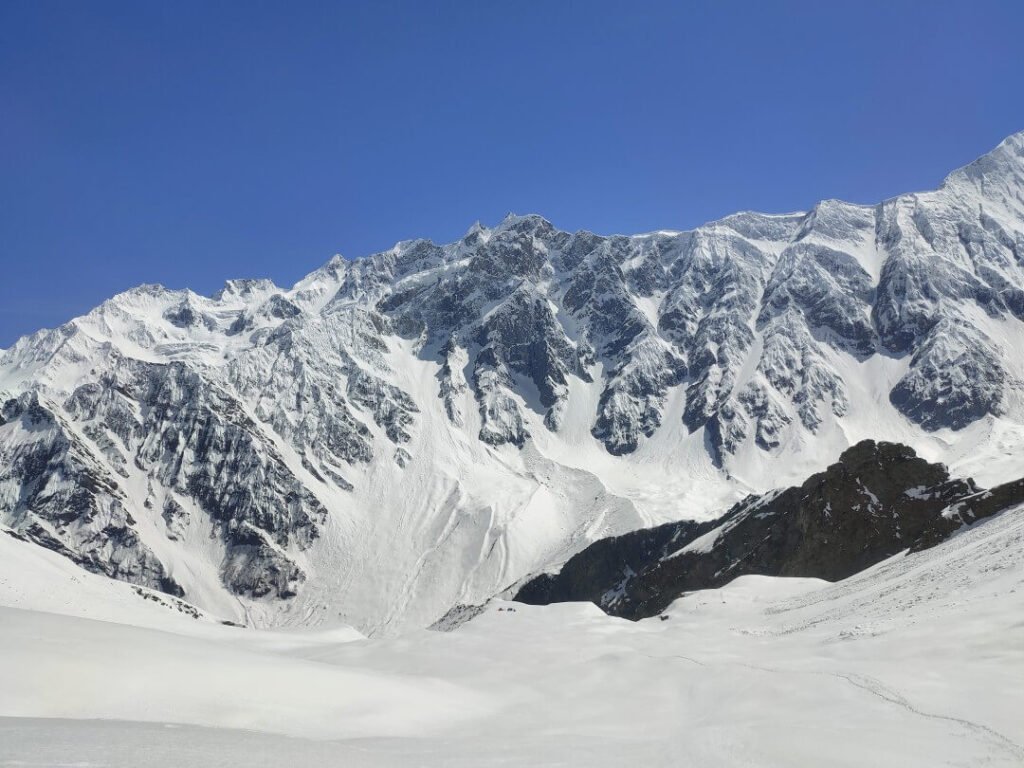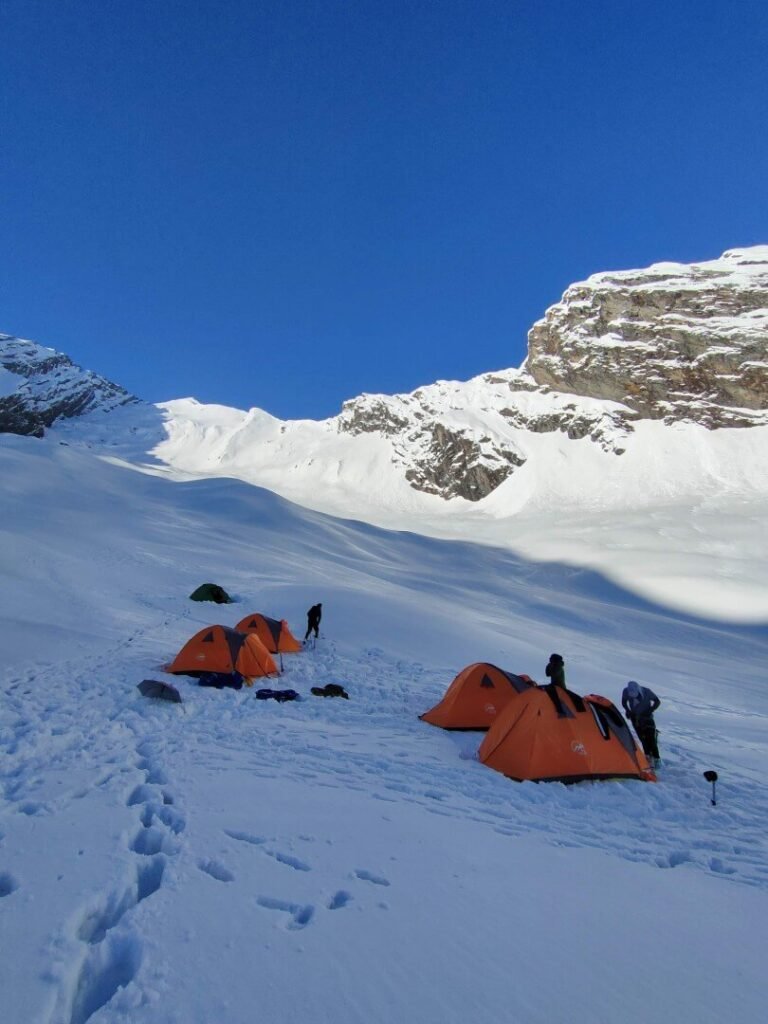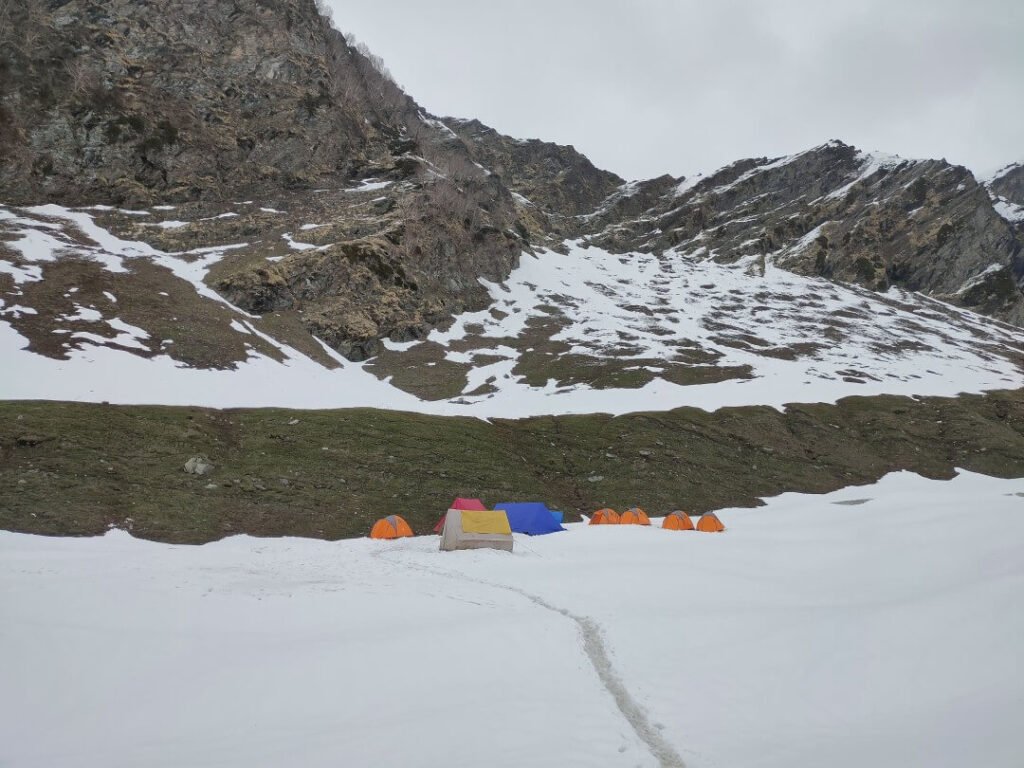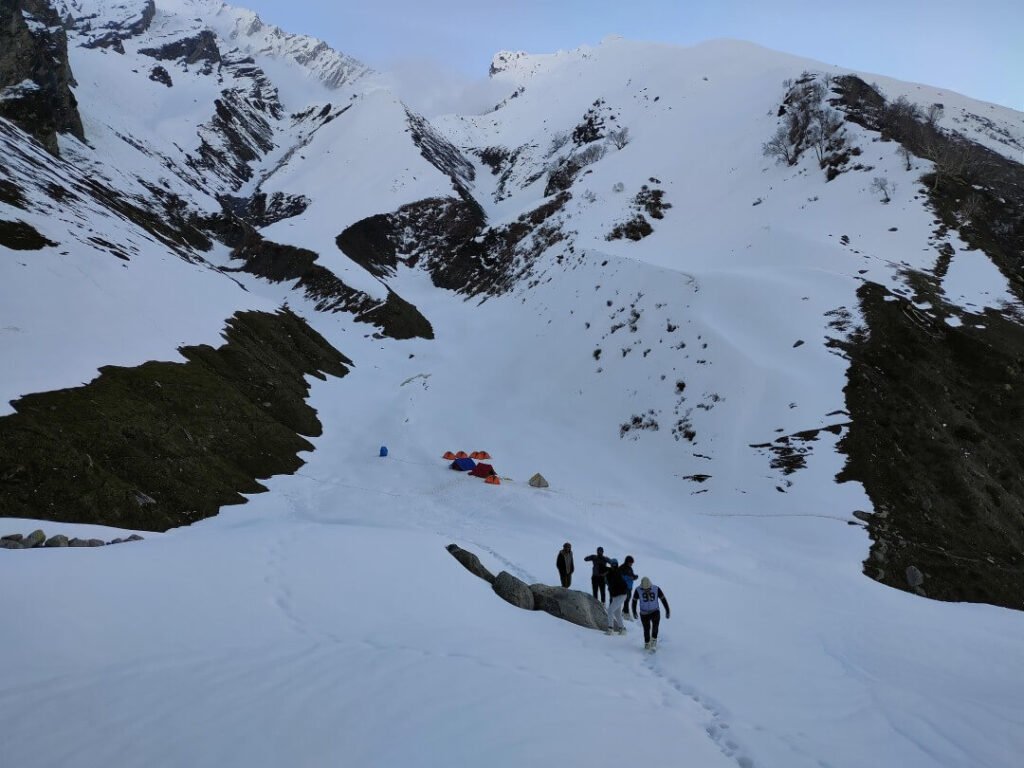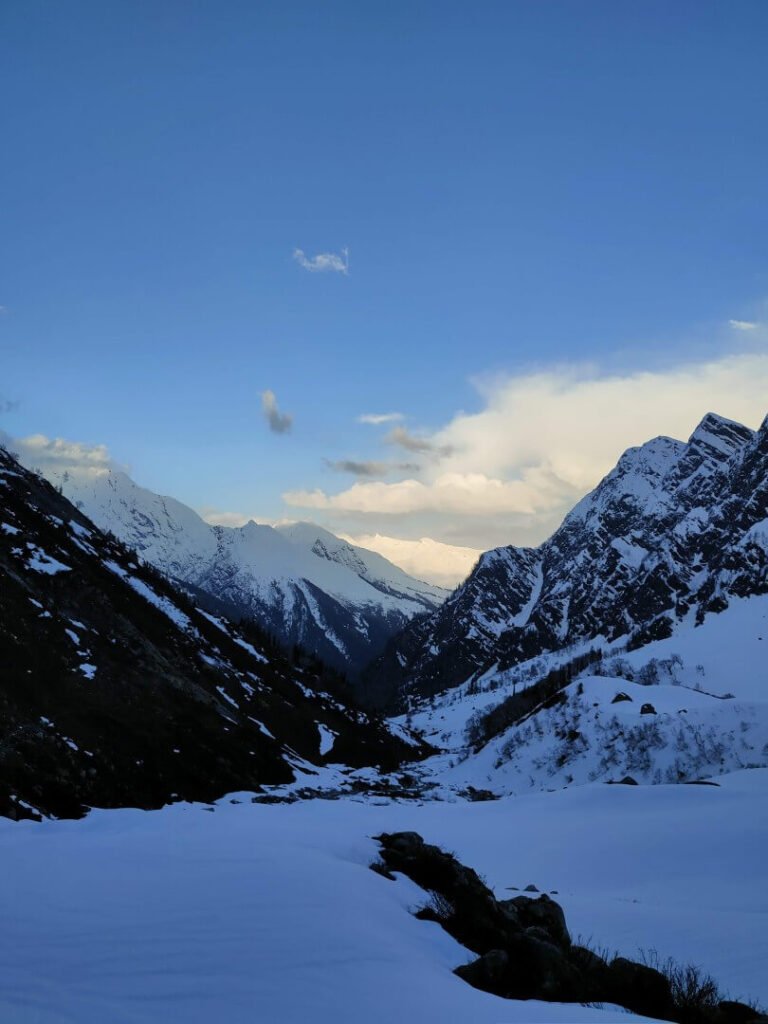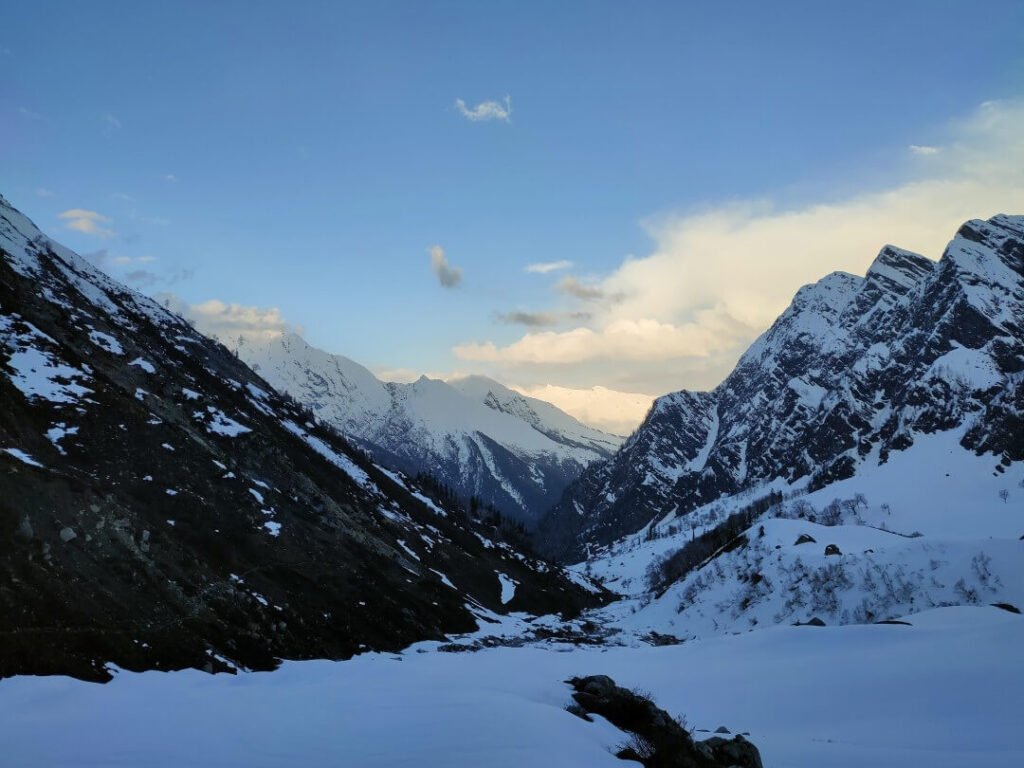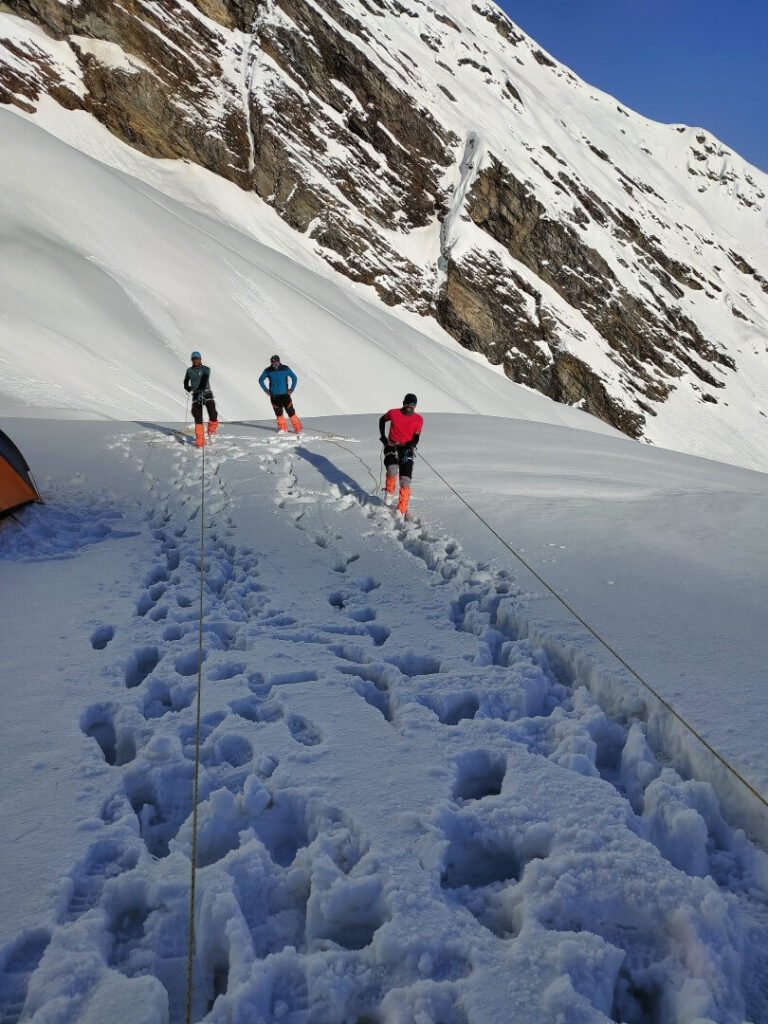Friendship Peak Trek
An exhilarating ascent to 5,289M, surrounded by stunning Himalayan peaks.
Talk to an Expert
Trek Difficulty
Technical
Trek Duration
8 Days / 7 Nights
Highest Altitude
5,289 meters
Suitable For
Experienced trekkers
Accommodation
Twin/Triple sharing*
Total Trek Distance
Approx. 28–30 km
Basecamp
Manali
Accomm. Type
Hotels / Tents
Pickup Point
From Manali
Accommodation Level
Economical
Friendship Peak
Where Endurance Meets Adventure
The Friendship Peak Trek is an 8-day high-altitude journey in Himachal Pradesh that takes trekkers through glaciers, alpine meadows, and steep snow slopes.
At 5,289 meters (17,350 ft), the summit offers breathtaking views of the Pir Panjal and Dhauladhar ranges, including Deo Tibba and Indrasan.
The final ascent is steep and exposed, requiring technical climbing gear like crampons, ice axes, and ropes.
This trek is perfect for experienced trekkers looking for an intense mountaineering challenge before attempting 6,000M+ peaks.
Trek Fee & Commercials
INR 35,000 + 5% GST
(Manali to Manali, all-inclusive)
Optional Add-ons
- INR 2,000 Backpack Offloading
- INR 1,500 Single Tent Accommodation
- Travel & Emergency Insurance
Available Dates to Register
- May 9 – May 16 , 2026
- June 13 – June 20, 2026
- Sept 26 – Oct 3, 2026
Additional Information
Inclusions & Exclusions
Inclusions
- Accommodation in Manali – Comfortable guesthouse/hotel stays on Day 1 (twin/triple sharing basis).
- All meals during the trek – Nutritious vegetarian + egg meals from dinner on Day 1 to lunch on Day 7/8.
- Technical climbing gear – Includes all essential mountaineering equipment: ropes, helmet, ice axe, crampons, mountaineering boots for summit day.
- High-quality camping equipment – Twin-sharing tents, sub-zero sleeping bags, insulated mats.
- Terrain-specific gear – Includes gaiters, crampons, and microspikes based on snow conditions.
- Experienced expedition team – Certified expedition leader, experienced local mountain guides, and skilled support staff.
- Private transport logistics – From Manali to Dhundi (trek start point) and back.
- Safety measures – Includes well-stocked first aid kit, portable oxygen cylinder for emergencies, and evacuation stretcher.
Exclusions
- Hotel stay in Manali on last day of trek – Not included, can be arranged separately.
- Meals during road transfers – Meals while traveling to/from Manali are not included.
- Personal expenses – Snacks, drinks, tips, souvenirs, laundry, etc.
- Travel insurance/trek insurance – Not provided, but highly recommended for all participants.
- Personal porter/mule – Not included. Can be arranged at extra cost if required.
- IMF fees for foreign nationals – Approximately USD 75 per person (payable in Manali).
- Insurance – Not included, trekkers should arrange their own health and travel coverage.
- Anything not specifically mentioned in inclusions.
Why is Friendship Peak a Must Do Trek?
A True Alpine Climbing Experience
This trek is a semi-technical climb, requiring crampons, ropes, and an ice axe. Perfect for those aiming to gain mountaineering skills.
Steep Summit Push at 5,289M
Unlike gradual climbs, the final ascent is steep and exposed, making for an intense but rewarding challenge. Trekkers need strong endurance and mental resilience.
Glacier & Snowfield Traverses
Navigating icy patches and high-altitude snow sections under moonlit skies during the summit push is an experience few treks offer.
360° Himalayan Views from the Top
The summit rewards climbers with spectacular views of the Pir Panjal & Dhauladhar ranges, featuring Deo Tibba, Indrasan, and Hanuman Tibba.
A Trekker’s Step Toward 6,000M+ Peaks
Ideal for those preparing for expeditions like Stok Kangri, Kang Yatse, or other Himalayan summits.
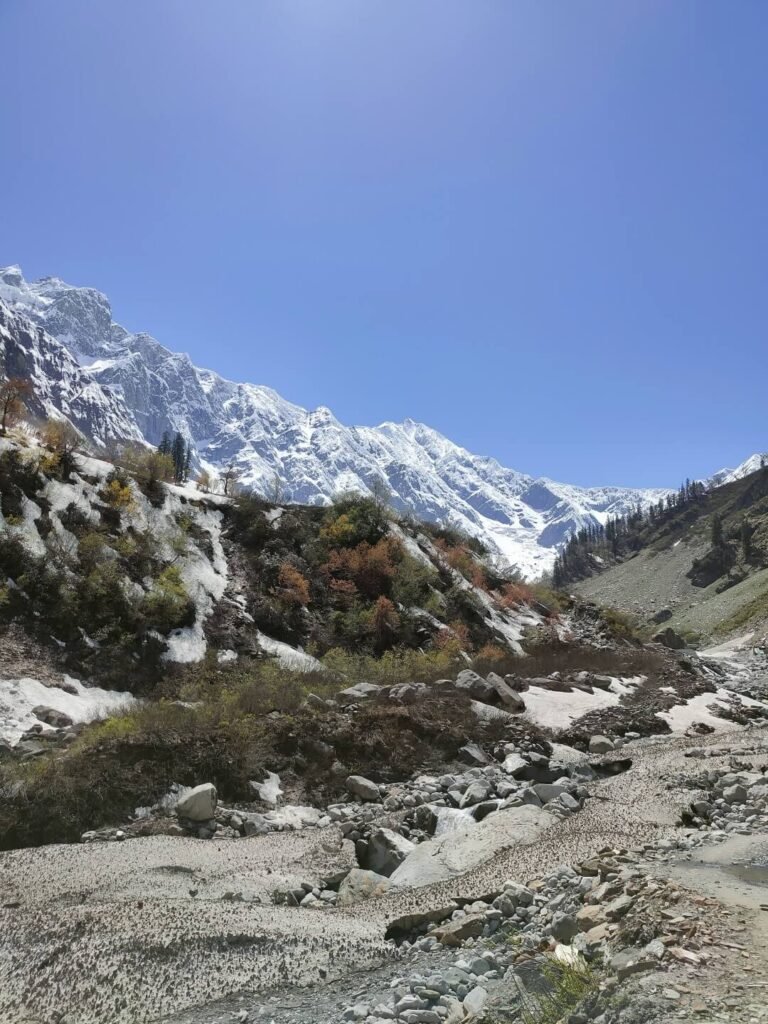
Friendship Peak Trek – 8 Day Detailed Itinerary
Day 1: Arrival in Manali (2,050M)
- Arrive in Manali by morning and check into a guesthouse/hotel.
- Team introductions, medical checks, and a detailed trek briefing.
- Gear check: Ensure boots, crampons, ice axes, and essential personal gear are ready.
- Light acclimatization walks around Manali’s scenic surroundings to help adjust to altitude.
Day 2: Trek to Bakarthach (3,300M)
- Trek Distance: ~6 km | Duration: 1–2 hrs
- Begin trek from Dhundi, following the Beas River through pine forests and alpine meadows.
- Pass through the tree line, gaining about 800 meters in elevation.
- Enjoy stunning views of Hanuman Tibba and surrounding peaks.
- Reach Bakarthach, a breathtaking high-altitude pasture known as "Shepherd’s Meadow."
Day 3: Trek to Lady Leg (3,800M) – Summit Camp
- Trek Distance: ~5 km | Duration: 4–5 hrs
- The trail turns rugged and steep, featuring moraine, rocky terrain, and snow patches (depending on season).
- Reach Lady Leg base camp, named for its distinct shape resembling a bent leg.
- Rest and acclimatize at summit camp, preparing for higher-altitude challenges.
Day 4: Load Ferry & Acclimatization Day
- Trek Duration: 3–4 hrs
- Short load ferry trek to higher altitude points, helping lighten the summit push.
- Technical training begins: Ice axe handling, crampons usage, snow gaiters, roping techniques. Mock roping drills & self-arrest techniques for steep snowfields.
Day 5: Move to Summit Camp (4,000–4,200M)
- Trek Distance: ~3 km | Duration: ~2.5 hrs
- After a hot lunch at Lady Leg, begin a short ascent to Summit Camp (~2 PM).
- Retrace familiar training paths, making the climb feel more manageable.
- Carry all summit essentials: warm layers, technical gear, energy snacks, hydration packs.
- Strategic purpose: Reduces summit push distance, improving success chances.
- If weather does not permit shifting to Summit Camp, we will launch the summit attempt directly from Lady Leg.
Day 6: Summit Day – Friendship Peak (5,289M) & Return to Lady Leg
- Start Time: Midnight (~12–1 AM) | Duration: 10–14 hrs (round trip)
- Navigate glacier crossings, steep snow slopes, and exposed ridges in the dark using headlamps.
- Full use of technical alpine gear: ice axe, crampons, harness, helmet, ropes.
- Summit Reward: Panoramic views of Pir Panjal & Dhauladhar ranges, overlooking Deo Tibba, Indrasan, and Hanuman Tibba.
- Careful descent back to Lady Leg camp, allowing for proper recovery.
Day 7: Buffer Day (Weather/Reserve)
- Purpose: Reserved for bad weather, altitude adjustments, or unforeseen delays.
- Why it's important: Increases summit success rate, ensuring safe and strategic climbing.
- If unused, this day can be spent resting or descending early.
Day 8: Trek to Dhundi & Drive Back to Manali
- Trek Distance: ~6 km | Duration: ~4–5 hrs | Drive: ~1 hr
- Final descent to Solang through the scenic forested trails.
- Private transport back to Manali, followed by farewell lunch and group photo session.
- Trek wrap-up and sharing of experiences.
Facts and Important Information
Manali – Gateway to Friendship Peak
By Air
Nearest airport: Kullu–Manali Airport (Bhuntar – KUU), ~50 km from Manali
Direct flights from Delhi (regular) and Chandigarh (seasonal).
From Bhuntar: 2–3 hrs by taxi/bus.
By Road (Most Common)
Delhi → Manali: ~540 km, 12–14 hrs
Overnight Volvo / HRTC / private buses available daily
Scenic drive via Chandigarh – Mandi – Kullu
By Rail
Nearest broad-gauge station: Chandigarh (CDG)
From Chandigarh: 8–10 hrs by road to Manali
(Alternative narrow-gauge option via Kalka–Shimla, then road)
1. Government-Issued ID
- Accepted IDs: Aadhar Card, Passport, Driver’s License, Voter ID.
- Carry original and 2–3 photocopies for verification.
- Required in case of permits, emergency, or administrative processing.
2. Medical Certificate (Fitness Declaration)
- Must be issued by a registered medical practitioner.
- Should clearly state fitness for high-altitude trekking up to 5,289M.
- Senior citizens & trekkers with pre-existing conditions may need additional clearance.
- Captain Alpine will provide the standard format for this certificate.
3. Disclaimer/Indemnity Form
- Signed declaration acknowledging risks involved in high-altitude trekking.
- Provided by Captain Alpine Outdoors before the trek begins.
- Must be signed before departure to participate in the expedition.
4. Passport & Visa (For Foreign Nationals)
- Carry original passport and valid Indian visa.
- Provide 2–3 photocopies for permits and local clearances.
- Some areas may require special approvals, depending on regulations.
Expedition Leader & Guide
- Certified & experienced high-altitude trekking experts.
- Leads the group, sets the pace, monitors health & morale.
- Trained in first aid, AMS response, and emergency evacuation.
- Decision-maker for route changes, health concerns, and weather delays.
Kitchen Staff & Cook
- Prepares nutritious and hot meals at each campsite.
- Follows strict hygiene standards for meal preparation.
- Adapts meals based on altitude conditions & energy needs.
- Can accommodate basic dietary restrictions with prior notice.
Support Staff (Helpers & Camp Managers)
- Set up tents, dining area, and sleeping arrangements.
- Manage water logistics, campsite cleanliness, and basic trek support.
- Assist trekkers during river crossings, steep sections (on request).
Mule/Porter Team
- Trekkers carry only a daypack with essentials (camera, water, snacks, rain gear).
- Personal backpacks can be offloaded (optional, pre-booking required).
Pre-Trek Health Requirements:
- Medical Fitness: Consult your doctor and ensure you’re fit for high-altitude trekking (up to ~17350 ft).
- Vital Checks Mandatory for Medical Certificate: Blood pressure, heart rate, and general stamina assessment.
- Acclimatization Readiness: Especially important if you’ve had altitude-related issues in the past.
Physical Fitness Preparation:
- Cardio Training: Brisk walking, jogging, cycling, or swimming (4–5 days/week for 4–6 weeks before the trek).
- Strength & Endurance: Core and leg strengthening (e.g., squats, lunges, planks).
Practice Treks: Do day hikes with a backpack to simulate trek conditions.
Altitude Awareness:
- The expedition reaches altitudes up to 5,289 meters (17,350 feet)
- Watch for signs of Sickness :
- Headache, nausea, dizziness, loss of appetite, fatigue.
- Report any symptoms immediately to the Expedition leader.
- Headache, nausea, dizziness, loss of appetite, fatigue.
Essential Personal Medication:
- Carry your personal prescription meds.
- Pack a basic first-aid kit: paracetamol, pain relief spray, band-aids, ORS, antiseptic cream, etc.
NOTE:- Dont take any medicine without informing your trek leader
Health & Safety Guidelines:
- Avoid alcohol, smoking, or sedatives during the trek.
- Hydrate regularly—even if you don’t feel thirsty.
- Maintain personal hygiene, especially at campsites.
- Listen to your body, and never ignore discomfort.
Emergency Protocol:
- Expedition leaders carry a basic medical kit and are trained in wilderness first aid.
- In case of serious illness or injury, evacuation support will be arranged.
- A buffer day is included in the itinerary for recovery or delays due to health/weather.
Trekking to an altitude of 6,240M is possible at any age with intentional preparation and respect for the mountain.
1: Mindset and Preparedness:
- Understand that the trek involves semi-technical climbs, cold glacier sections, and long summit hours of 10–12 hours.
- Seniors should be in excellent cardiovascular health and comfortable walking 8–10 km daily with elevation gain.
- Be aware of altitude risks and mentally prepared for the challenging conditions.
2. Mandatory Medical Clearance:
- Consult your doctor with a detailed itinerary and altitude profile.
- Opt for cardiac stress and lung function tests if necessary.
- For conditions like hypertension or diabetes, discuss medication adjustments with your physician.
3: Physical Preparation Plan (3–6 Months):
- Walking and Hiking: Build up to 10–12 km daily walks with inclines, 3–5 times a week.
- Strength Training: Focus on legs, hips, and core to improve stamina and balance.
- Breathwork and Stair Training: Practice controlled breathing exercises to improve oxygen efficiency and incorporate stair climbing with light weights.
4: Acclimatization Tips:
- Spend at least 3–4 days in Leh (3,500M) prior to the trek for acclimatization.
- Stick to a slow and flexible itinerary to ease into higher altitudes.
- Avoid heavy meals, alcohol, and caffeine during the initial acclimatization period.
5: Essential Medications and Monitoring:
- Carry required medications, such as those for blood pressure or insulin, and monitor vitals with an oximeter. Oxygen saturation levels should ideally remain above 80% at high camps.
Trekking to Dzo Jongo East is not recommended for individuals below the age of 17, as the physical and mental demands of the trek are significant.
Friendship Peak Trek Trivia
The Summit Reveals a Different View Depending on the Season In summer, the Pir Panjal and Dhauladhar ranges stretch endlessly in crystal-clear visibility, but in autumn, the landscape is often blanketed in golden hues as valleys transition before winter.
The Name "Friendship Peak" Has Multiple Stories Some locals believe the name symbolizes the camaraderie and teamwork needed to reach the summit, while others say it’s derived from ancient trade and pilgrimage routes crossing these high-altitude trails.
Unpredictable Snow Formations Make Every Climb Unique The snow patterns shift constantly, creating new crevasses and ridges each season—meaning trekkers rarely take the exact same route up the peak two years in a row.
A Secret Glacial Water Source Hidden Near Base Camp Most trekkers assume water is scarce at high altitudes, but a hidden glacial stream near Lady Leg Base Camp offers pure mountain water—if you know where to find it!
Latest Reviews
” Aenean sollicitudin, quis auctor, nisi elit consequat ipsum, nec sagittis sem nibh id elit. Duis sed odio. “
Lauren Munoz
Ronald Snyder
Jessica Hawkins
Sean West
Book your spot for Friendship Peak 2025 Departures and challenge yourself to reach the 5,289M summit!
F.A.Q.
The trek is difficult and technical, requiring prior high-altitude trekking experience. Climbers will encounter glacier traverses, steep snow slopes, and roped sections requiring crampons and ice axes.
The Friendship Peak summit stands at 5,289 meters (17,350 ft), making it one of the most rewarding non-technical climbing peaks in Himachal Pradesh.
Trekkers should have previous high-altitude experience and be comfortable walking 8–10 km per day with elevation gain. This trek is not advisable for beginners due to its technical nature.
Trekkers will need to use ice axes, crampons, ropes, harnesses, and mountaineering boots for safe glacier and snowfield navigation, especially during the summit push. Training sessions are conducted at base camp.
The Friendship Peak Trek spans 8 days and 7 nights, including acclimatization, load ferrying, summit attempt, and buffer days for weather or altitude adjustments.
Yes, Day 7 is a reserved buffer day to accommodate weather delays or altitude sickness recovery, ensuring higher summit success rates.
The ideal trekking season runs from late May to mid-June, when snow conditions are stable and the weather is most favorable for a safe summit push.
- Manali: Guesthouse/hotel stays on Day 1
- During the trek: Twin-sharing alpine tents with sub-zero sleeping bags and insulated mats
- Single tent accommodation available at extra cost
Trekkers begin their summit push around midnight (12–1 AM), navigating steep snow slopes and exposed sections. The climb takes 10–14 hours before descending back to Lady Leg base camp.
Yes, backpack offloading is available for ₹2,000 per trekker, allowing trekkers to carry only essentials in their daypack.
Khumbu Glacier (4,900m) is the highest glacier in the world, forming part of the Everest Base Camp route.
Trekkers immerse themselves in Sherpa culture, experiencing warm hospitality, traditional prayer flags, Buddhist monasteries, and local mountain life.
No, this trek is not advisable for first-time trekkers due to its technical challenges and high-altitude difficulty. Participants should have prior trekking experience before attempting Friendship Peak.
Oxygen levels at Everest Base Camp (5,364m) are nearly 50% lower than at sea level, making acclimatization essential to prevent altitude sickness.

Contact
Phone
9897521533
support@captainalpine.com
Address
69 vedanth, first floor, alpha international city, sector 29, karnal, haryana, 132001

